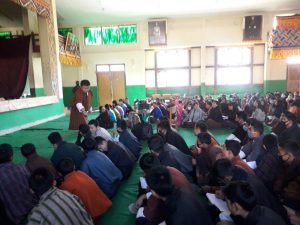December eNews
Suja Dzow, a Conversation on Urbanisation in Bhutan
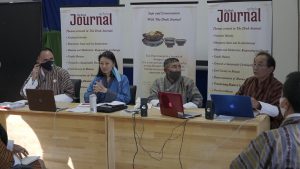
Meghraj Adhikari, the first Bhutanese urban planner, spoke about the failure to implement the TSP due to lack of funding and resources and highlighted co-ordination amongst relevant authorities as a problem with most organisations choosing to work in silos. Siok Sian Pek-Dorji, an editorial member of The Druk Journal, spoke about the importance of the inclusive development processes with wide consultations and engagement of end-users in the planning and design process. Tashi Penjor, the Chief Urban Planner from Works and Human Settlement Ministry, spoke about how the introduction of the zoning system during lockdown is paving the way for urban planning and development in Dzongkhags across the country. Jigme Thinley, a lecturer at College of Science and Technology (CST), spoke about rental unaffordability in Phuntsholing with the market being driven by private developers, thereby inflating the market.
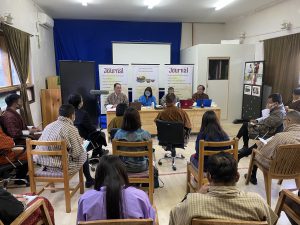
More than 100 students and faculty from CST attended the conversation via Zoom and a small in-person audience of 22 were present at The Media Lab, which included the current and former Thimphu Thrompons, urban planners from the MoWHS, Thimphu Thromde (City Corporation) and private design firms, members from the political parties, architects, development partners and the media.
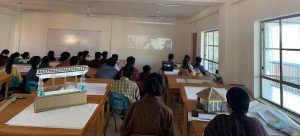
CST students joining the conversation via Zoom.
Thank you to DIPD & JICA for supporting the conversation.
Reset At The Media Lab: Climate Justice
How do we approach the middle path to secure a sustainable ecological development while promoting economic progress that is justifiable and socially responsible?
What is our vision of sustainable economic development for Bhutan?
The thought-provoking questions by the speakers initiated a critical discussion on climate justice in Bhutan at the third Reset! At The Media Lab.
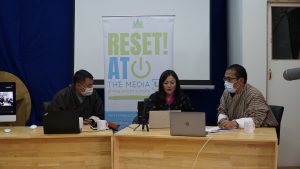
Thinley Namgyel, an independent consultant and former chief at the Climate Change Division in the National Environment Commission, presented a comprehensive overview of the environment acts and policies in Bhutan. This enabled the audience to understand how Bhutan is working toward achieving sustainable ecological development, and also shed light on the citizens’ role during the consultations of these legislations.
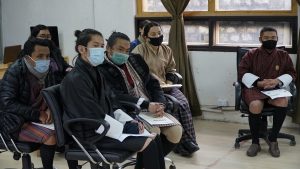
An important takeaway from this discussion was the responsibility of the citizens in being aware of how our actions disrupt the ecosystem and compromise the inter-generational equity.
We had a large turnout of Zoom audience with a total of 239 students of Environmental Science, Eco-Geography, Population and Development Studies from Sherubtse College, and 39 students of Sustainable Development from the College of Natural Resources.
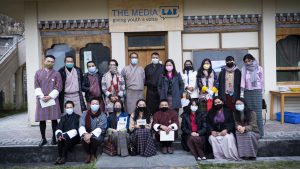
Check out the speaker presentations below:
Pem Lama – https://bit.ly/37ICrpD
Thinley Namgyel – https://bit.ly/3haTJPj
We would also like to extend our gratitude to CISU – Civilsamfund i Udvikling for supporting Reset! At The Media Lab.
Conversation Series 5 – Anticipatory Governance
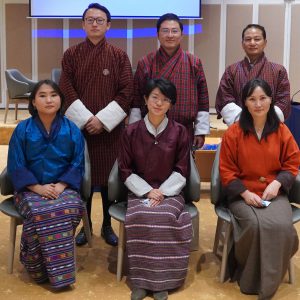
The #ReimagineBhutan Conversation Series came to an end with the final theme focusing on Anticipatory Governance where the speakers discussed the way forward for a governance system that is agile, adaptive, innovative and anticipatory.
The speakers highlighted the need for a collaborative approach between the citizens, civil society, public and private sector to encourage an ecosystem for anticipatory governance. It’s not just about predicting the future and being prepared but it’s about the ability to adapt to things that might not have predicted.
COVID-19 has brought along unprecedented opportunities to inculcate the value of innovation, creativity and entrepreneurship especially in the public sector, so it is more agile, productive and proactive. The requirement for a transformational shift in not just how we do things, but how we think about it is essential for the public sector.
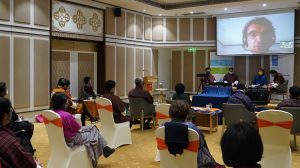
Anticipating the market and using predictive data analysis plays a key role in the private sector as they constantly need to be addressing the changes, the needs and demands of the customers. The only way to succeed is by being able to adapt to a changing market. The success of the private sector in innovating and taking risks will be essential in helping the public sector shift their mindset and the way they work to be responsive to changes.
The lack of space for creative thinking and quality data for decision making in Bhutan were seen as major issues within the public sector. How can we have an anticipatory governance system if we don’t have real-time relevant data for planning or the space to try innovative ideas? The success of technology and innovation relies on the presence of data, statistics and transparency of data which is not available in Bhutan and is something we need to work towards.
Incentivising the public sector to inculcate innovative and entrepreneurial mindsets; creating flagship summits where citizens, members of civil societies, public and private sector come together for collaboration; and a foresight centre that analyses and creates solutions for future problems, and regulatory sandboxing initiatives to promote innovation were suggestions from the panellists on the way forward.
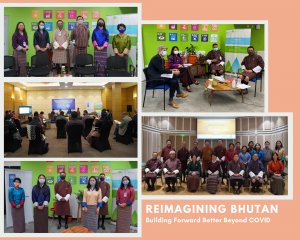
Thank you to UNDP for the successful collaboration throughout the series.
Youth Voices: Youth Matters Report
‘Youth Voices: Youth Matters’ report will become a useful resource for both policymakers as well as youths with interest in socio-political matters of Bhutan, as it captures a youth-led, youth-driven and youth-centric model of engagement and participation within policy. This approach marks a significant change in Bhutan where youths have traditionally been seen as passive recipients of policy decisions and not as stakeholders that need to be engaged and consulted.
The report provides the entire National Youth Policy (NYP) revision process by Youth Initiative (YI) members; it includes their own review of the policy, their roles in leading consultations with 114 other youths of Bhutan from various walks of life, and also the online survey that was launched to widen the reach to 1,099 other youths.
However, the most treasured section of the report consists of pertinent and extant issues that have been identified across various thematic areas by youths themselves and corresponding solutions and interventions that they would like to see implemented. The report weaves together the ‘big picture’ of the landscape that youths navigate in Bhutan through a large quantitative set of data; with the indispensable testimonials and revealing glimpses into the thoughts of youth through the qualitative data gathered during the consultations.
You can now access the report here:
This report is supported by UNICEF, Department of Youth and Sports and Ministry of Education.
Media Literacy Participants Become Media Nomads
The training of trainers on Media and Democracy Literacy (MDL) in October inspired a number of initiatives that expanded the reach of MDL to 37 parents and teachers in Paro and Punakha and 450 students in Thimphu.
“Media literacy must be introduced to students from pre-primary because children as young as six years old now have access to gadgets and the internet.” said the Principal from Olathang Primary School, Paro. The 9 teachers at the training in Olathang reflected on their online behaviours and felt the urgency to develop a social media guideline to model positive online behaviour and review the existing social media guideline of their school.
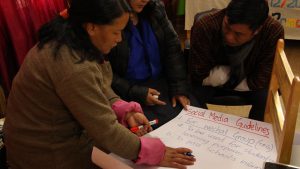
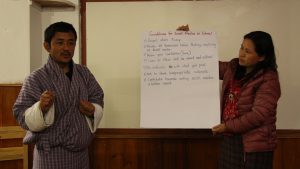
Meanwhile at Lobesa Secondary School, Punakha, 28 parents deliberated on the double-edged nature of social media. The parents reconciled that children can’t be denied access to mobile phones, however, it is equally important to introduce quality family time to connect and share the benefits and dangers of the internet among other things. “A broken mobile can be repaired at the repair stations but a child spoiled [addicted] to a mobile can be difficult to repair.” said a parent. To start that process at home, the parents co-developed social media guidelines for their families — one of which was to watch the news as a family.
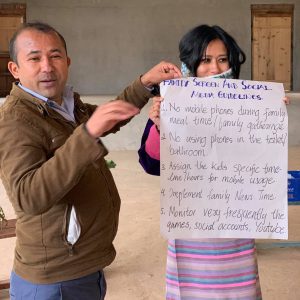
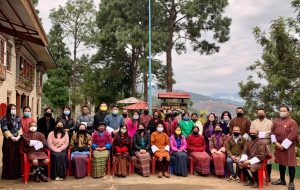
At Wangbama Central School, Thimphu, around 450 students received an introduction to media literacy. The major learning for the students was having the tools to distinguish news from other forms of information and misinformation.
